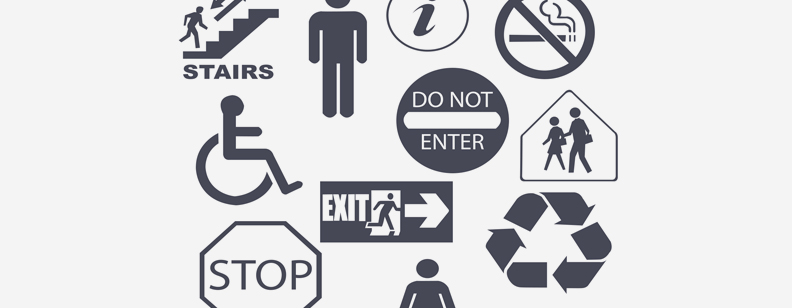On Public signs (Two)
This is nothing, but for fun…
OK, in this part, I’m going to point out some problems existing in public signs translation. Although translation of such materials is not something new and much emphasis has been laid to it, the current situation is far from satisfactory. Problems that existed before are still prevalent in practical translation these days and the quality of translation leaves much to be desired.
Very good signs, I think…what a great Party…We are all affected…
Problems in linguistic aspect:
Chinese and English belong to different language families, thus there are many differences between them. For instance, Chinese words are formed of some characters with meanings, yet English words are composed of some meaningless letters; Chinese is a parataxis language, while English is a hypostasis language; Chinese has no clear signs of tenses and voices, which are definitely shown in English. Due to so many differences, it is virtually necessary to consider many aspects in translating Chinese expressions into English.
1. Wordy language:
Here is a slogan of an activity held,“创一流服务,迎接四海宾客”, someone translated as:“Welcome our honored guests from home and abroad with first-class Services”. In my opinion, we can briefly translate this sentence into:“First class service to all guests”. Because “all guests” here presents “四海宾客”.
2. Without standard language:
Someone translated “闲人免进” into English is:“No admission for man with nothing to”, but if you refer to the conventionalized speech in English it should be: “Staff Only”. For the reason that public signs play a very important role in the daily life both the native and the traveler, any misunderstanding and ambiguity may cause serious consequences. All the public signs used in our daily life have been standard. For example:
双向行驶 Two Way
小心玻璃 Glass
游客服务中心 Visitor Center
外币兑换 Foreign Exchange
免税店 Duty Free Shop
3. Grammatical errors:
In a souterrain,“残疾人通道” is translated as “Disabled Access”. The word here is used to modify the word“access”, which means the access is disabled. It is more proper and polite to translate it as “Access for the Underprivileged”.
4. Spelling mistakes:
These errors are due to carelessness either of translators or printers. Public signs with spelling errors may not cause severe misunderstanding, but make negative impression on readers and discount the effectiveness that public signs should achieve.
It may be shocked to see such an expression “Read End Collision” on highway, with the original meaning “追尾危险”. This public sign is very common and essential on highways to warn drivers against accidents and keep the traffic order. The key word “Rear”, however, is mistaken for “Read”, and with no doubt the sign loses the intended meaning.
For Chinese children, I think this sign is quite easy to understand. But for foreign ones, I guess not… “Keep yourself away from the danger of deep water”, maybe they should try this one…
Problems in cultural aspects:
Problems of this type deals with a more comprehensive aspect—culture. Translation involves language as well as culture. Many tourists hold that the best translation should be the “cultural translation” instead of mere “linguistic translation”. “Translation is intercultural communication, the ultimate goal of C-E is to let outside world know China, to improve the transmission of Chinese culture and promote mutual communication between China and other countries”. The quality of translation is evaluated by how the readers comprehend it, which means the functions of public signs in the two cultures should be the same. Problems concerning this aspect are similar to those with “hidden injuries”.
1. Harsh mood:
Some signs such as “禁止入内”,“禁止践踏草坪”,“违者罚款” can be seen everywhere in big cities, for most Chinese, they are not disturbed by these characters. But if you think carefully, this kind of public signs contain a tone of command and mandatory. Chinese word“禁止”often be translated into “don’t” in English. It is not euphemistic enough in English. For example:
禁止摘花 Don’t pick the flowers.
禁止往车窗外仍东西 Don’t throw something out the window of the train
禁止喧哗 don’t make noisy
禁止践踏草坪 don’t tread on the grass
Obviously, we can hardly find any mistakes grammatically. However, it has a very rough or rude tone which gives us a sense of distance. Being a host, we absolutely can’t leave such an impression on our guests. So maybe we can translate such sentences without using the word “don’t”, for example:
禁止摘花 keep away from the flowers, please or take care of the flowers, please.
禁止喧哗 quiet, please
2. Chinglish:
To translate these publicly used expressions with Chinese characteristics into standard English as native speakers, we need to make great efforts in understanding the implied cultural meaning. The Chinese and British have different thought patterns and consequently different ways to express ideas. If an expression or sentence is described as English but with Chinese characters, Chinglish occurs.
To be specific, it is the misshapen, hybrid language that is neither Chinese nor English. Translators will be inevitably influenced by their mother tongue, which may result in unsuccessful translation without critical thinking. For example: “游客止步”is one of the most common public signs in all scenic places.
The version as “Visitors Go No Further”, “Stop” and “Guests, Stop Here” may confuse the foreigners and misleading them into standing by the sign board. If it is rendered as “Closed to Visitors” or “Out of Bounds”, foreigners will not be puzzled.
What’s your first impression if you see this kind of signs on the street? Whether to laugh or cry… but one thing is quite certain that you wouldn’t take your girlfriend to there…“拿铁咖啡” doesn’t mean “coffee with iron”, instead it is a kind of Italian coffee combined espresso with milk, which named Caffè Latte.



